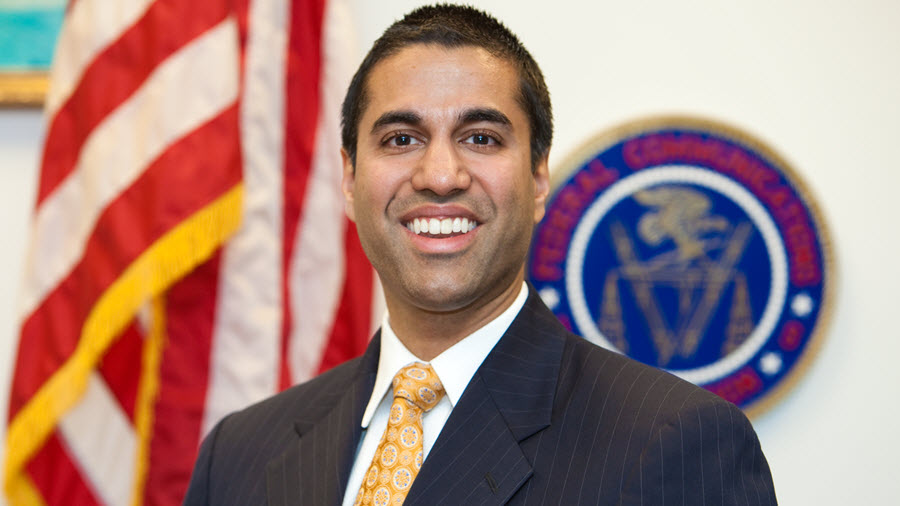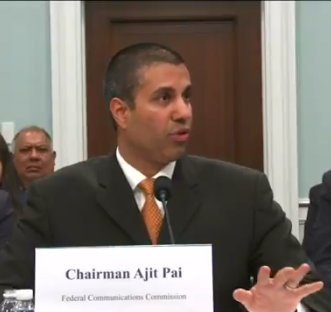FCC's Pai Won't Commit to Delaying Sinclair Decision for Court Ruling

The smarter way to stay on top of broadcasting and cable industry. Sign up below
You are now subscribed
Your newsletter sign-up was successful
FCC chair Ajit Pai wasn't predicting when the FCC's vetting of the Sinclair-Tribune deal would be complete, but suggested at a Hill hearing Thursday (April 26) that the FCC had not yet had a chance to fully evaluate it.
Sinclair filed its latest, and expected to be last, amendment to the deal earlier this week.
Pai was the single witness at a House Financial Services and General Government Subcommittee hearing on the FCC's budget. He would not agree to delay a decision on the Sinclair-Tribune deal until a court ruling on a related issue, the UHF discount.
[D.C. Court hears arguments for, against UHF discount]
Pai said he would factor the potential court decision into the FCC's decisionmaking. One thing the FCC could do would be to condition the deal on the court upholding the UHF discount.
Pai was grilled by ranking member Rep. Mike Quigley (D-Ill.) about contacts with Sinclair about deregulation of the deal.

Quigley said that such contacts "reveal a disturbing pattern that jeopardizes the independence of the FCC." He also pointed out that there was an FCC inspector general investigation in progress on possible improper contacts with Sinclair.
Quigley cited Sinclair's new version of the deal, in which it is divesting 23 stations in 18 markets--including ones where it would not have to divest under local ownership rules but likely would to quell Justice concerns about ad concentration.
Quigley, whose home TV market is Chicago, also cited the spin-off of WGN-TV Chicago to the owner of a car dealership owned by Sinclair's executive chair, and with an option for Sinclair to buy the station back (the FCC is considering raising the 39% ownership cap). Quigley said Sinclair "stretches the definition of divestiture under the plan to something unrecognizable."
He slammed the deal as reducing diversity, quality local content, competition and viewpoint diversity, and said the planned divestitures make a mockery of FCC rules.
Sinclair has argued that the deal is necessary to keep pace with cable companies and over-the-top providers, which have no comparable ownership limits and that it will expand local news, not contract it. It's most recent deal iteration included spinning of stations to multiple minority companies, Sinclair pointed out this week.
[Sinclair deal shot clock still paused]
Pai said the FCC had provided information about those contacts to the House Energy & Commerce Committee, but also said he had made a presentation to Sinclair GMs in 2016 about the need for broadcast deregulation, a view Sinclair shares and one that Pai has long held.
The smarter way to stay on top of broadcasting and cable industry. Sign up below
Quigley pointed to reports that the D.C. Appeals Court hearing the related UHF discount deregulatory decision might well roll back the UHF discount that was central to the Tribune purchase, and asked if Pai would agree to hold off on a decision on Sinclair.
Pai said that was a case of clashing hypotheticals, both what the court would do with the discount and what the FCC would do with the proposed merger, and declined to answer, or provide a timetable on when the deal vetting would be finished.
At about the same time Quigley was calling for the delay, most of two dozen Democratic senators were trying to leverage that upcoming court ruling to delay a decision on Sinclair, as well as generally shorten the string on the chairman's broadcast deregulatory weed whacker.
Contributing editor John Eggerton has been an editor and/or writer on media regulation, legislation and policy for over four decades, including covering the FCC, FTC, Congress, the major media trade associations, and the federal courts. In addition to Multichannel News and Broadcasting + Cable, his work has appeared in Radio World, TV Technology, TV Fax, This Week in Consumer Electronics, Variety and the Encyclopedia Britannica.

